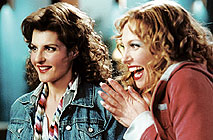|
|
|
|
Connie
and Carla
|
 |
|
An eternal Holy Grail pursued by Hollywood studios is the hit film that effortlessly unites two very distinct audiences – such as the male and female demographic, or children and adults. But perhaps the trickiest combination of all is to simultaneously please straight and gay audiences. Many movies that attempt this particular balancing act fall flat on their faces. Connie and Carla, however, walks this tightrope with a fair amount of grace and verve. It is the latest project by Nia Vardalos, star and writer of the woeful My Big Fat Greek Wedding (2002). Here she trades racial stereotypes for sex-and-gender stereotypes. All the gays in this movie are fabulously witty, show-tune-loving, screaming drag queens, while all the straight blokes are uptight, unfunky and burdened with a sluggish, literal sense of humour. In a small reminder of her previous success, Vardalos also makes the community of drag queens more racially mixed and harmonious than the whitebread, mainly working-class straights. Connie (Vardalos) and Carla (Toni Collette) are two wannabe song-and-dance performers stuck at the bottom rung of showbiz. Their romantic lives with their respective boyfriends seem similarly stalled in mediocrity. After Connie and Carla inadvertently witness the execution of a club owner by gangsters, they seize the opportunity to flee, relocate in Los Angeles and start their lives over. Both happily and unhappily for them, fate decrees that their cover-identities will be as gay drag queens. Director Michael Lembeck (who did The Santa Clause 2 [2002] before this film and The Santa Clause 3 [2006] after it) works with a premise that is unstable and never entirely convincing. In an emblem of the way the film tries to play to diverse audiences, Connie and Carla are presented in two diametrically opposed ways. On the one hand, their crazy act – mixing selections from Liza Minnelli, Jesus Christ, Superstar, Evita, Oklahoma! and other kitsch monuments – is offered, from their straight perspective, as genuinely intended and unselfconsciously 'one from the heart'. But, of course, from the perspective of the gay following that they instantly acquire, their act is a riot of ironic, second-degree camp. This split-focus creates a few problems for the unfolding plot. In a bizarre moment that has no follow-up, Connie's tendency to talk dirty on stage is metamorphosed into a biting tirade composed of gay-style banter. More generally, the film constantly vacillates on the question of how much 'in the know' these women are about the manners and values of the subculture they have accidentally adopted. Sometimes their grasp of the situation amounts to nothing more than lowering their voices and "talking like a man"; at other times, they act as if they would be right at home among the all-knowing TV hosts of Queer Eye for the Straight Guy. No film with gay content that is also determined to charm a straight audience can be complete without a fish-out-of-water identification figure who is the embodiment of normal, heterosexist society. Here, this rather thankless role is embodied by Jeff (David Duchovny). He not only experiences a strange attraction towards Connie – who, of course, he assumes is a gay man – but must also negotiate his fraught relationship with his gay brother, Robert (Stephen Spinella). Jeff must, like the musical performances, serve a double duty: for hopeful gay viewers, he is a beacon of tolerance and the potential for change in society's dominant attitudes; for more recalcitrant straight viewers, he is a reassuring barometer of occasional disgust towards the odd world that assails him (a scene in which he is revolted by Connie's kiss is particularly irksome) and the figure who promises, amid all the camp confusion and gender masquerade, a handy bit of heterosexual romance. Connie and Carla is, as mainstream entertainment, far less progressive than Blake Edwards' Victor/Victoria (1982) on this score. But it still manages to deliver some heartwarming sentiments. Where the film really picks itself up, however, is in its plentiful sequences of musical performance. Vardalos and Collette could have easily settled for a sloppily comic, amateur effect (Priscilla-style), but have instead wisely aimed for the stars. It is an unending delight to observe the ensemble effect of them singing and dancing in close unison, right down to the tiniest vibrato note. Their dual effort pays off in the film's biggest laugh – a sight gag involving the audience reaction during "Don't Cry For Me, Argentina". Adding a brief footnote to this musical pleasure is an improbable but enjoyable cameo by Debbie Reynolds. When did she become an icon of gay pop culture? MORE gay comedies for straights: To Wong Foo, Strange Bedfellows, Three to Tango, In & Out © Adrian Martin August 2004 |
![]()